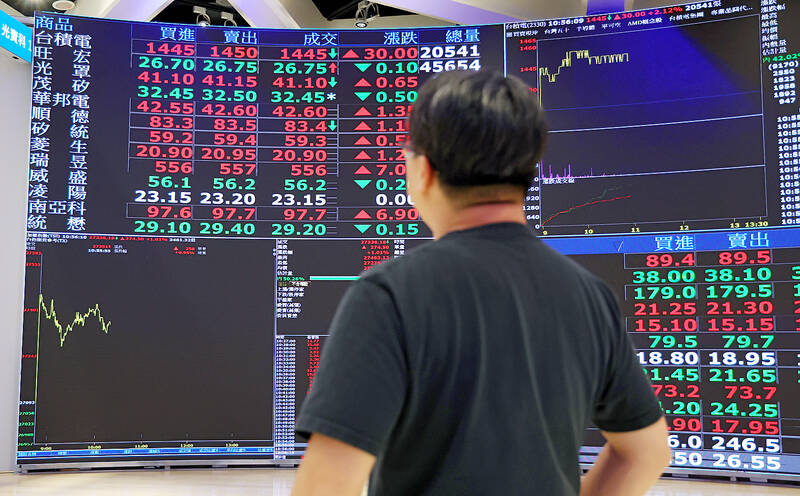Taiwanese shares yesterday closed at a new high, but gave up most of earlier gains as investors rushed to lock in their significant profits built in recent sessions with contract chipmaker Taiwan Semiconductor Manufacturing Co (TSMC, 台積電) in focus.
The TAIEX closed up 63.78 points, or 0.23 percent, at 27,752.41. Turnover on the main board totaled NT$513.92 billion (US$16.74 billion), Taiwan Stock Exchange data showed.
Foreign institutional investors sold a net NT$240.71 million of shares on the main board, the exchange said.

Photo: CNA
Despite the high closing, “investors have turned cautious about a possible major technical pullback after the TAIEX posted gains since US President Donald Trump’s administration announced sweeping reciprocal tariffs in April,” Mega International Investment Services Corp (兆豐國際投顧) analyst Alex Huang (黃國偉) said.
Before yesterday, the TAIEX had soared 10,296.87 points, or 59.21 percent, from the closing level of 17,391.76 on April 9.
“Today’s expanded turnover showed many investors tended to trim holdings now; TSMC was among the targets,” Huang said. “But I prefer to say TSMC’s fundamentals stay sound, while such positive leads have been priced in.”
TSMC, the most heavily weighted stock, closed unchanged at NT$1,480, off a high of NT$1,500, while iPhone assembler Hon Hai Precision Industry Co (鴻海精密) rose 0.21 percent to close at NT$239.
Elsewhere, most stock markets extended gains yesterday on further signs that US-China trade tensions were easing and as investors looked to corporate earnings.
Tokyo hit another record as Japan swore in new prime minister Sanae Takaichi and brought an end to a period of political uncertainty, while the yen weakened amid higher expectations for a slower pace of interest rate hikes under Takaichi’s government.
Additional reporting by AFP

In Italy’s storied gold-making hubs, jewelers are reworking their designs to trim gold content as they race to blunt the effect of record prices and appeal to shoppers watching their budgets. Gold prices hit a record high on Thursday, surging near US$5,600 an ounce, more than double a year ago as geopolitical concerns and jitters over trade pushed investors toward the safe-haven asset. The rally is putting undue pressure on small artisans as they face mounting demands from customers, including international brands, to produce cheaper items, from signature pieces to wedding rings, according to interviews with four independent jewelers in Italy’s main

Japanese Prime Minister Sanae Takaichi has talked up the benefits of a weaker yen in a campaign speech, adopting a tone at odds with her finance ministry, which has refused to rule out any options to counter excessive foreign exchange volatility. Takaichi later softened her stance, saying she did not have a preference for the yen’s direction. “People say the weak yen is bad right now, but for export industries, it’s a major opportunity,” Takaichi said on Saturday at a rally for Liberal Democratic Party candidate Daishiro Yamagiwa in Kanagawa Prefecture ahead of a snap election on Sunday. “Whether it’s selling food or

CONCERNS: Tech companies investing in AI businesses that purchase their products have raised questions among investors that they are artificially propping up demand Nvidia Corp chief executive officer Jensen Huang (黃仁勳) on Saturday said that the company would be participating in OpenAI’s latest funding round, describing it as potentially “the largest investment we’ve ever made.” “We will invest a great deal of money,” Huang told reporters while visiting Taipei. “I believe in OpenAI. The work that they do is incredible. They’re one of the most consequential companies of our time.” Huang did not say exactly how much Nvidia might contribute, but described the investment as “huge.” “Let Sam announce how much he’s going to raise — it’s for him to decide,” Huang said, referring to OpenAI

The global server market is expected to grow 12.8 percent annually this year, with artificial intelligence (AI) servers projected to account for 16.5 percent, driven by continued investment in AI infrastructure by major cloud service providers (CSPs), market researcher TrendForce Corp (集邦科技) said yesterday. Global AI server shipments this year are expected to increase 28 percent year-on-year to more than 2.7 million units, driven by sustained demand from CSPs and government sovereign cloud projects, TrendForce analyst Frank Kung (龔明德) told the Taipei Times. Demand for GPU-based AI servers, including Nvidia Corp’s GB and Vera Rubin rack systems, is expected to remain high,